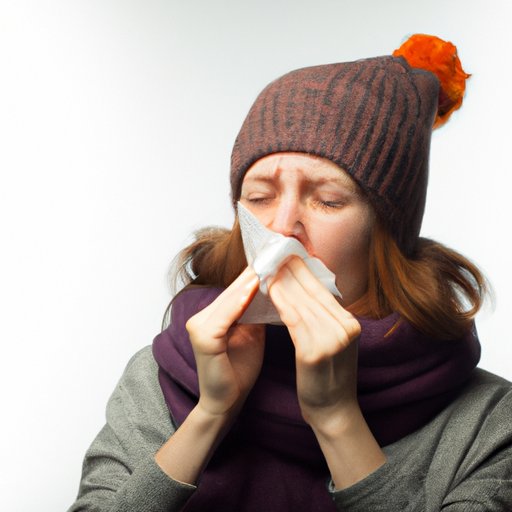
Introduction
Many people believe that cold weather causes illnesses, such as the common cold and flu. This common belief has been passed down for generations, and it remains a deeply ingrained misconception. However, as the scientific understanding of infectious diseases has advanced, researchers have discovered that cold temperatures alone do not cause illness. In this article, we will debunk common myths about the relationship between cold weather and sickness and provide practical tips for staying healthy during the winter months.
Busting the Myth: Can Cold Weather Actually Make You Sick?
One of the most widely held misconceptions is that cold temperatures cause illnesses. While it’s true that cold and flu seasons tend to coincide with the winter months, experts now believe that this correlation is due to other factors, such as decreased humidity and more time spent indoors, rather than the cold weather itself. In fact, research has shown that viruses responsible for the common cold and flu are more stable and can spread more easily in low humidity conditions.
The Connection Between Cold Temperatures and Illness: Debunking Common Misconceptions
Another common misconception is that going outside with wet hair or without proper winter attire will make you sick. While it’s important to dress warmly during the winter, being cold or wet does not directly cause illness. Rather, it may weaken the immune system, making individuals more susceptible to infections. It’s a lack of precautions that leads to getting sick rather than solely cold temperatures.
Does Cold Weather Cause the Common Cold? Separating Fact from Fiction
The common cold is a highly contagious viral infection that affects individuals across the world regardless of the climate, season or weather. While exposure to cold weather may temporarily lower immunity levels, it does not cause the common cold. Rhinoviruses are the most common cause of the common cold, and they can be contracted at any time of the year. Practicing good hygiene practices, such as washing your hands with soap frequently, is the best defense against catching the cold or flu.
Winter Wellness: Tips for Staying Healthy in Cold Weather
There are several practical steps you can take to reduce your risk of illness during the winter months. Dressing appropriately, drinking plenty of fluids, and washing hands frequently are all essential to maintaining good hygiene and preventing illness. In addition, maintaining a healthy diet and staying active can boost the immune system and minimize the risk of illness. Get outside, breathe in some fresh air and take a walk but ensure to dress yourself as per the weather outside to keep you warm.
The Scientific Explanation: How Cold Weather Affects Your Immune System
The immune system is an incredibly complex network of cells and tissues that work together to protect the body from viruses, bacteria, and other pathogens that cause illness. Cold weather can weaken the immune system by constricting blood vessels and reducing circulation, potentially making it more difficult for immune cells to travel throughout the body. Additionally, exposure to cold temperatures may interfere with the production of white blood cells, which are essential to fighting off infections.
From Frostbite to Flu: Understanding the Health Risks of Cold Weather
Cold weather can pose a range of health risks, from mild conditions like chapped lips to more severe conditions like frostbite and hypothermia. Frostbite occurs when the skin and underlying tissues freeze due to prolonged exposure to cold temperatures, while hypothermia occurs when the body’s temperature drops below normal due to prolonged exposure to cold. Both can be prevented by dressing warmly and seeking warmth when necessary. In addition, individuals should be aware of the signs of illness and seek medical attention immediately if symptoms persist.
The Surprising Link Between Indoor Heating and Cold-Related Illnesses
While staying indoors is recommended during the colder months, it’s essential to maintain a healthy indoor environment to avoid cold-related illnesses. Indoor heating can lead to dry air, which can irritate the nasal passages and make it easier for viruses to spread. Adding a humidifier to the home can help to moisten the air and prevent the spread of germs. It’s also important to maintain a regular cleaning schedule to avoid the buildup of dust and other allergens.
Conclusion
Cold weather on its own does not cause illness, though it can weaken the immune system. Rather than blaming cold weather for getting sick during winter months, individuals should take preventative measures to safeguard their health. These measures include dressing appropriately, staying active, eating a healthy diet, maintaining a clean indoor environment, and practicing good hygiene practices. By prioritizing these habits, individuals can reduce their risk of illness and enjoy a happy, healthy winter season.





